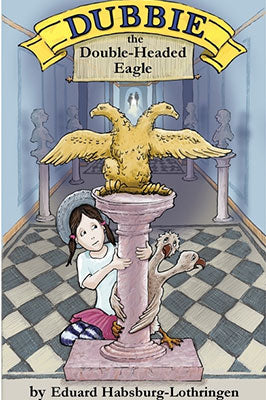I am an adult reader . . . and stayed up late reading this book, mostly in one sitting. DUBBIE: THE DOUBLE-HEADED EAGLE is a delightful tale filled with everything you could want in a children's book. I state that with utmost respect, as both a writer and a teacher who studied children's literature in college. In the words of Madeleine L'Engle, "You have to write the book that wants to be written. And if the book will be too difficult for grown-ups, then you write it for children." DUBBIE perfectly exemplifies that concept.
The endearing personalities of Dubbie's two unique heads bring the story to life, as does the soaring backdrop of Vienna. Indeed, this is such an instance that the setting itself seems almost like a character, so vivid as it is. As another sign of a wonderful story, the reader is eager to visit the places illustrated as a result of experiencing this adventure. Colorful personalities continue to abound with the appearance of a villainous pair, a less kind-hearted "double head" of humans. Yet, unlike the two heads of DUBBIE who are distinctive yet must learn to be more united, they are clones incapable of growth while they remain on their current path. Herein enters the thematic depth that so many do not realize can be present in children's literature, as they dismissively brush aside a work simply because of its target audience. With this pair and their associates, Archduke Eduard Habsburg presents the concept of an unchanging "status quo" preserved by a sinister force in an effort to prevent the countercultural heroism of old from rising up in modern society and instead keep dust on the page.
Yet, at the same time, I loved how humor remained present throughout the manifestation of these thought-provoking topics. The two menacing figures who shall remain unnamed (to avoid spoilers) seem like classic villains from an old spy novel of times past---colorful yet black-and-white, amusing yet hardcore, with conversational turn-of-phrase that you don't often see in villains of today. It is "classic" and refreshingly nostalgic---light enough for a children's book, but villainous enough and with high enough stakes for children to also take it seriously. Likewise, as Little Dubbie continues on his journey, the reader cannot help but smile at the delightful quirks, lovable nature, and entertaining moments (Goodness, that part where Dubbie tries to look like the 2-D double eagles!) inherent in our favorite young double eagle. It gets to the point where almost everything Dubbie does---even peeking out of a backpack---is just adorable. Perhaps most of all, there is humor and cleverness sprinkled in the very essence of the writing style that, along with the adventure, will keep you turning the page. In short, it is full of life.
In addition to the thought-provoking themes and humorous elements---or, more accurately, at the very center of it all---is a heartwarming message about the importance of family. There are, of course, related sub-themes, as well, that provide great lessons for children. In other words, this isn't a book that you have to worry about handing to your kids. On the contrary, it's exactly the sort of book you would want them to read, and exactly the sort of book they would enjoy reading. It likewise provides a fun way for kids to learn history. After all, it is always best to view history as a fascinating story rather than a series of isolated facts.
This story is not without mystery, and one of my favorite parts is a reveal toward the end that eventually leads to a rather epic scene. Vague, I know, but you're going to read the book, aren't you?
I COULD go on. There are other lovely characters, including the young girl Emma in whose shoes children may step in order to journey with her double-headed friend. They will each learn from each other. But perhaps I will simply end thusly:
I have always considered Edward Eager's books to be among the best models of what children's literature should be: appealing to children through imaginative insight while still filled with thematic depth. In fact, my favorite book by him, KNIGHT'S CASTLE, contains a profound message about chivalric values and modern society. When reading DUBBIE: THE DOUBLE-HEADED EAGLE, I was reminded of Edward Eager and how profound and timeless a good children's book can be. Yet DUBBIE likewise has its own unique signature that marks it as distinctive from any other book.
Brilliant and beautiful work that children and parents alike will love and remember long after the last page is turned. Bravo!

